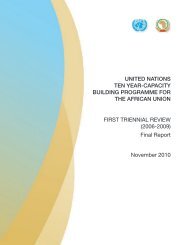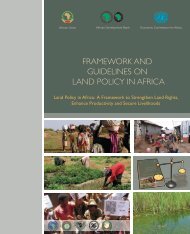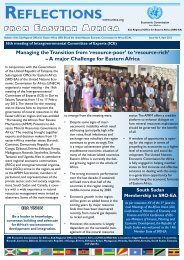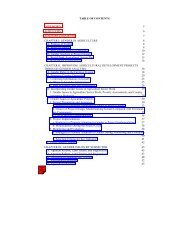A Decade of NEPAD - Economic Commission for Africa - uneca
A Decade of NEPAD - Economic Commission for Africa - uneca
A Decade of NEPAD - Economic Commission for Africa - uneca
Create successful ePaper yourself
Turn your PDF publications into a flip-book with our unique Google optimized e-Paper software.
56 A <strong>Decade</strong> <strong>of</strong> <strong>NEPAD</strong>: Deepening <strong>Africa</strong>n Private Sector and Civil Society Ownership and Partnership<br />
promote <strong>NEPAD</strong>, meant that stakeholders <strong>of</strong>ten were<br />
challenged to figure out how to engage with the <strong>NEPAD</strong><br />
programme at the national governmental level. This<br />
deficiency also meant that “<strong>NEPAD</strong> projects”, even<br />
those acknowledged as part <strong>of</strong> the STAP initiatives and<br />
as part <strong>of</strong> the <strong>NEPAD</strong> Plan <strong>of</strong> Action, faltered because<br />
there was little domestic support <strong>for</strong> the programmes<br />
and initiatives, financial or otherwise.<br />
ӹ Inadequate Coordination at the Continental Level and<br />
Duplicity at the Regional Level – Again, the OSSA<br />
research confirmed the assessment made by the AU<br />
and UNECA, finding that within the first ten years <strong>of</strong><br />
<strong>NEPAD</strong> private sector (and CSO) stakeholders were<br />
<strong>of</strong>ten confused and confounded by the lack <strong>of</strong> communication<br />
among the RECs, the lack <strong>of</strong> galvanizing<br />
leadership, weak follow-up mechanisms, and the lack<br />
<strong>of</strong> REC goals and priorities translating into national<br />
goals and priorities. Furthermore, the fact that there<br />
was significant (and increasing) overlap in terms <strong>of</strong><br />
strategy and programmes among the RECs, meant<br />
that stakeholders were also confronted with duplicative<br />
initiatives with no strong rationale given to make participation<br />
in one REC the priority or more compelling<br />
than the other. For <strong>Africa</strong>n enterprises, belonging to<br />
multiple regional business associations or programmes<br />
was also taxing financially, and in terms <strong>of</strong> time and<br />
resource investment. Lastly, during the OSSA discussions,<br />
stakeholders complained that there was a further<br />
complication in terms <strong>of</strong> duplicity in that the various<br />
G8/ donor initiatives <strong>of</strong>ten seemed to compete <strong>for</strong> the<br />
attention, resources and support <strong>of</strong> local stakeholders.<br />
Thus, the UK supported <strong>Commission</strong> <strong>for</strong> <strong>Africa</strong>, the<br />
Clinton Initiative <strong>of</strong> <strong>for</strong>mer U.S. president Bill Clinton,<br />
the U.S.’ Millennium Challenge Account, the Chinese<br />
and Indian initiatives vis-à-vis <strong>Africa</strong>, Japan’s TICAD,<br />
along with the <strong>Africa</strong>-EU Partnership, and various UN<br />
and World Bank initiatives were not always aligned,<br />
individually, nor in regard to “support” <strong>for</strong> <strong>NEPAD</strong>,<br />
and this created “noise” in regard to the implementation<br />
<strong>of</strong> <strong>NEPAD</strong>.<br />
ӹ Inadequate Engagement Ef<strong>for</strong>ts Made to Attract <strong>Africa</strong>n<br />
Private Sector and CSO Stake Holders – the duplicity<br />
mentioned above also was confounded by perceptions<br />
that inadequate outreach ef<strong>for</strong>t was made by <strong>NEPAD</strong><br />
to engage domestic <strong>Africa</strong>n stakeholders with the same<br />
fervour that ef<strong>for</strong>ts were made to engage donor partners.<br />
Very little input was asked <strong>of</strong> the <strong>Africa</strong>n private sector<br />
(or CSO community) and thus very little ownership<br />
was felt among <strong>Africa</strong>n stakeholders in the <strong>NEPAD</strong><br />
“process”, programmes or in the implementation <strong>of</strong><br />
projects. Furthermore, the perception was that very<br />
little ef<strong>for</strong>t was made to segment the private sector<br />
stakeholder communities (i.e. <strong>Africa</strong>n trans-national<br />
corporations, <strong>Africa</strong>n chambers <strong>of</strong> commerce, <strong>Africa</strong><br />
pr<strong>of</strong>essional and sector associations, SMEs capable<br />
<strong>of</strong> playing a role at national level, in<strong>for</strong>mal enterprise<br />
that could benefit from resources/ technical assistance<br />
mobilized via <strong>NEPAD</strong>) and toward developing messages<br />
that spoke to them individually.<br />
ӹ Lack <strong>of</strong> Consistent and Positive Media Coverage – NE-<br />
PAD was also poorly publicized in the media over its<br />
first tenyears, internationally, and particularly on the<br />
<strong>Africa</strong>n continent. In <strong>Africa</strong>n coverage by international<br />
press (BBC, Al Jazeera, Canal Plus, CNN), <strong>NEPAD</strong> was<br />
periodically mentioned but rarely very prominently<br />
after its inaugural few years. Also very little has been<br />
done to consistently unpack <strong>NEPAD</strong>, particularly by the<br />
<strong>Africa</strong>n broadcast media community. Ef<strong>for</strong>ts to translate<br />
<strong>NEPAD</strong> into local languages across the continent <strong>for</strong><br />
national radio and television transmissions have also<br />
been negligible.<br />
ӹ Restrictive Domestic and Regional Business Climates<br />
– Although as mentioned above, <strong>Africa</strong>n nations have<br />
been undertaking macroeconomic re<strong>for</strong>m initiatives <strong>for</strong><br />
much <strong>of</strong> the past 20 years and progress has been made,<br />
overall business climate optimization has lagged behind<br />
and this has and continues to impede <strong>Africa</strong>n private<br />
sector growth and development. This phenomenon has<br />
help lead to the significant number <strong>of</strong> in<strong>for</strong>mal <strong>Africa</strong>n<br />
enterprises that find it too cumbersome to <strong>for</strong>malize<br />
their businesses. While not specifically intended to be a<br />
constraint to private sector involvement with <strong>NEPAD</strong>,<br />
these general business climate challenges and impediments<br />
(bureaucracy and red tape, lack <strong>of</strong> procurement<br />
transparency, poor infrastructure, corruption, poor<br />
strategic planning, limited project in<strong>for</strong>mation dissemination<br />
mechanisms, limited capital markets, high<br />
costs <strong>of</strong> <strong>for</strong>mal business administrative compliance) all,<br />
indirectly, hampered private sector focus on <strong>NEPAD</strong>.<br />
ӹ (Perhaps unintended) Preference Given to Foreign Transnational<br />
Corporations Over <strong>Africa</strong>n Private Sector –<br />
Where there have been opportunities to design, develop<br />
and implement <strong>NEPAD</strong> projects – <strong>for</strong> fees or as in-kind<br />
contributions – disproportionately international corporations<br />
and firms have been given these opportunities.<br />
Or at least that is the perception that many in the<br />
<strong>Africa</strong>n private sector have had. This has not helped<br />
engender ownership sentiments about <strong>NEPAD</strong> within







